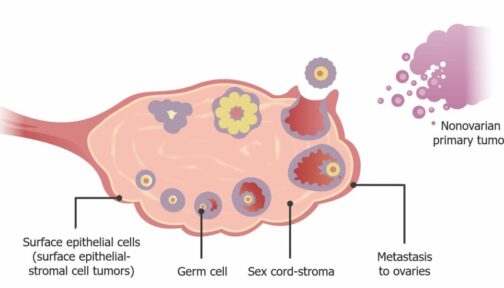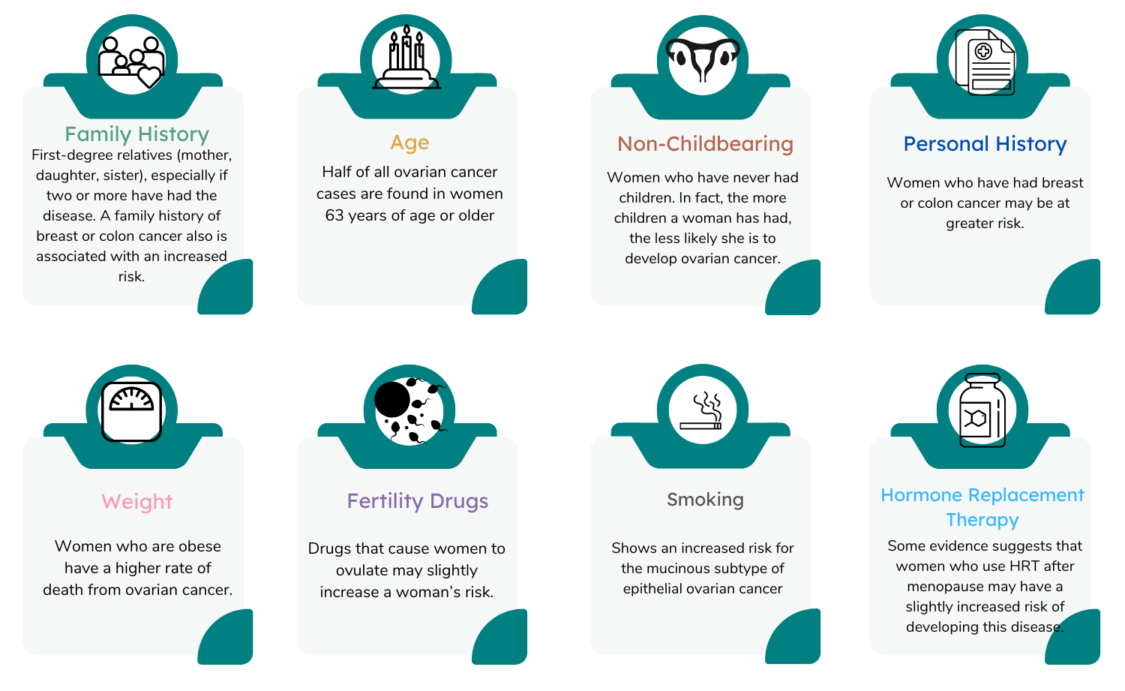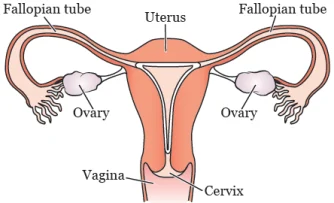
Ovarian cancer is a group of diseases categorized by the overgrowth of cells in the ovaries. These cells grow and divide uncontrollably, eventually taking over other parts of the body and destroying healthy tissue. Although ovarian cancer can spread throughout the entire body, in most cases it stays in the abdomen and affects organs such as the intestines, liver and stomach.
 A woman’s risk of getting ovarian cancer during her lifetime is about one in 67. The risk of getting this cancer and dying from it is one in 95. Ovarian cancer is the eighth most common cancer in women, excluding skin cancer. It is the fifth leading cause of cancer death in women.
A woman’s risk of getting ovarian cancer during her lifetime is about one in 67. The risk of getting this cancer and dying from it is one in 95. Ovarian cancer is the eighth most common cancer in women, excluding skin cancer. It is the fifth leading cause of cancer death in women.

- Epithelial Cell – Ovarian cancer that starts in the cells that make up the outer layer of the ovary. It is the most common type of ovarian cancer, but often caught in later stages.
- Germ Cell – Ovarian cancer that starts in the reproductive egg cells of an ovary.
- Stromal Cell – Ovarian cancer that starts in the cells that make up the supportive tissue layer of the ovary. It is often caught in early stages but is the least common type of ovarian cancer.



 Genetic Testing and Counseling – Several different mutations can lead to an increased risk for the development of ovarian cancer. However, most cases of ovarian cancer are not diagnosed in patients with genetic mutations.
Genetic Testing and Counseling – Several different mutations can lead to an increased risk for the development of ovarian cancer. However, most cases of ovarian cancer are not diagnosed in patients with genetic mutations.
- BRCA 1/2 – Mutations in either BRCA 1 or BRCA 2 genes lead to an increased risk for ovarian cancer and account for about 10-15% of all ovarian cancer diagnoses.
- Lynch Syndrome – A number of different mutations fall under the umbrella term of Lynch syndrome which can increase one’s risk for many types of cancer. Mutations in the MLH1, MSH6, or MSH6 genes of Lynch Syndrome increase the risk of developing ovarian cancer by age 70 11-17%.
- Birth Control – Oral contraceptive with both estrogen and progesterone taken for a prolonged period of 5 years or more can reduce one’s risk of ovarian cancer.
- IUDs – Recent research has found that women who used an IUD were 32% less likely to develop ovarian cancer than women who did not.
- Surgery – Usually preventative surgery will only be recommended for those with high risk of ovarian cancer. Surgical options include the preventative removal of the ovaries and other reproductive organs.

-
- Salpingo-oophorectomy – The surgical removal of both ovaries and fallopian tubes. Usually reserved for high-risk women who are done having children.
- Tubal Ligation – Fallopian tubes are cut, tied, or blocked to permanently prevent pregnancy.
- Salpingectomy – The surgical removal of the fallopian tubes.
 See your doctor right away if you experience:
See your doctor right away if you experience:
- Abnormal vaginal bleeding (particularly for those past menopause) or other abnormal discharge
- Additional symptoms to report to your doctor if they persist for 2 weeks or longer:
- Abdominal bloating or swelling
- Quickly feeling full when eating
- Weight loss
- Discomfort in the pelvic area
- Back or abdominal pain
- Fatigue
- Frequent urination or changes in bowel habits


- Ovarian cancer, when caught early, has a 5-year survival rate of 90%.
- 20% of ovarian cancer cases are currently diagnosed in stage 1 or 2.
- Stage 1 – cancer is confined to the ovaries; 90% of patients survive 5 years or more.
- Stage 2 – cancer is confined to the pelvis; 70% of patients survive 5 years or more.
- Stage 3 and 4 – cancer has spread beyond the pelvis; only 20-25% of patients survive 5 years or more.
 Tina’s Wish funds research specific to the early detection and prevention of ovarian cancer. Mammograms, colonoscopies, and pap smears are examples of tests for early detection of breast, colon, and cervical cancer. No such similar test exists for ovarian cancer.
Tina’s Wish funds research specific to the early detection and prevention of ovarian cancer. Mammograms, colonoscopies, and pap smears are examples of tests for early detection of breast, colon, and cervical cancer. No such similar test exists for ovarian cancer.
 If you or a loved one has been recently diagnosed with ovarian cancer, there are groups that can help. See below for more information:
If you or a loved one has been recently diagnosed with ovarian cancer, there are groups that can help. See below for more information:
- SHARE offers educational programs and support groups for individuals battling breast and gynecologic cancer, including ovarian cancer.
- Sharsheret has many programs and resources to help newly diagnosed individuals better understand their diagnosis and manage their treatment.
- The Ovarian Cancer Research Alliance, OCRA, is a great resource for those who are newly diagnosed with ovarian cancer, and they offer different support groups.
- OCRA also has an online chat room for individuals currently battling the disease and for survivors to share their experiences and offer advice.
- Red Door Community creates a community of cancer support. They have weekly and monthly support groups for all members. Anyone is welcome to join for free online or by phone: 212.647.9700.
MORE INFORMATION ABOUT OVARIAN CANCER CAN BE OBTAINED AT:
National Cancer Institute at the National Institutes of Health
cancer.gov/types/ovarian
U.S. Centers for Disease Control and Prevention
cdc.gov/cancer/ovarian
American Cancer Society
cancer.org/cancer/types/ovarian-cancer













